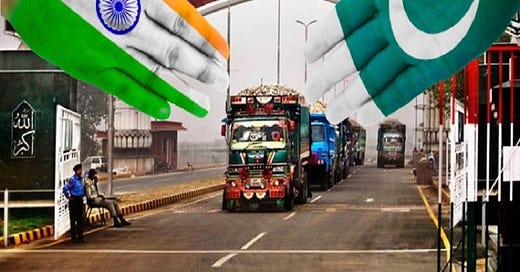Indo-Pak Trade Would Be Mutually Beneficial But Not A Political Or Military Deterrent
The resumption of Indo-Pak trade by itself wouldn’t influence either side’s stance towards the Kashmir Conflict, but it would strongly hint that Islamabad has tacitly shifted its position if this happens without Delhi reversing its abrogation of Article 370 like former Prime Minister Khan’s government demanded as a prerequisite for this occurring.
Pakistani Foreign Minister Bhutto told the Institute of Strategic Studies Islamabad on Thursday that the prior government’s disengagement from India doesn’t serve his country’s interests. Dawn, which is regarded as very close to the incumbent authorities who scandalously ousted former Prime Minister Khan in early April and should thus be regarded as a credible source when reporting on its official’s statements, said the following in their article about his speech: “The foreign minister contended that if Pakistan had achieved economic engagement with India in the past, it would have been in a better position to influence Delhi’s policy and prevented both countries from taking extreme positions.”
For as wishful as that scenario sounds, it’s not realistic. While Indo-Pak trade would be mutually beneficial with respect to improving their largely impoverished populations’ lives, neither nuclear-armed neighbor would be compelled to unilaterally concede on issues that they regard as being in their national interest, nor would their military be deterred from defending such as they see it. The Kashmir Conflict is regarded altogether differently by both state parties, and they’re not going to let bilateral trade influence their stance towards it. Nevertheless, Foreign Minister Bhutto might have actually been implying something else if one attempts to read between the lines.
While it’s admittedly speculative at this point, he probably wasn’t all that serious about bilateral trade influencing either country’s politicians or their military. Rather, while acknowledging that India hasn’t provided a “conducive environment” for economic re-engagement according to Dawn’s report, Pakistan’s top diplomat might have been hinting that the new authorities favor a gradual return to the pre-2019 status quo. In the event that the strict policy of former Prime Minister Khan’s government is “moderated” in any tangible way such as the resumption of trade with India despite Delhi not reversing its abrogation of Article 370 like Islamabad demanded, then it would be a concession from Pakistan.
Furthermore, any move in that direction would also hint that the new authorities tacitly accept that Delhi will never reverse that decision and that it thus represents the “new normal”. From there, it might just be a proverbial hop, skip, and a jump away from reviving the spirit of the so-called “Musharaff Plan” that would simply result in turning the Line of Control (LoC) into the international border. Regardless of whatever anyone on either side of the LoC thinks about that, it’s difficult to argue with the scenario sequence that was just described with respect to what the resumption of Indo-Pak trade absent the reversal of Delhi’s August 2019 decision per the demand of Islamabad’s prior government would imply.
Once again, nobody should doubt the mutual benefits of economic re-engagement, but nor should they believe that it would influence either conflicting party’s political or military decisions in and of itself since each side regards their respective stance as being in their objective national interests. Nevertheless, interpretations thereof can theoretically change so it also shouldn’t be discounted that the group that scandalously ousted former Prime Minister Khan might be considering the “recalibration” of their approach to the Kashmir Conflict, which Foreign Minister Bhutto might have been tasked with “gently” introducing to the public on the unrealistic pretext that he put forth.
To put it another way, the resumption of Indo-Pak trade by itself wouldn’t influence either side’s stance towards the Kashmir Conflict, but it would strongly hint that Islamabad has tacitly shifted its position if this happens without Delhi reversing its abrogation of Article 370 like former Prime Minister Khan’s government demanded as a prerequisite for this occurring. In that event, this development would be yet another piece of evidence contradicting the “official narrative” that he was ousted purely for economic reasons that his replacements claimed had nothing to do with changing his foreign policy. Whether that would for the best or worst when it comes to the Kashmir Conflict would be for Pakistanis to decide.




